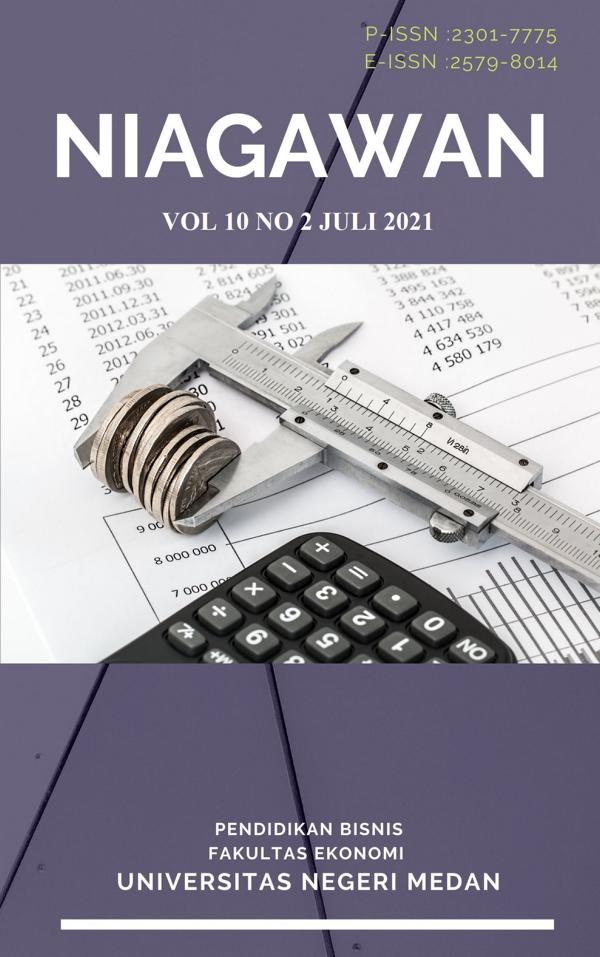IMPLEMENTASI TECHNOLOGICAL PEDAGOGICAL CONTENT KNOWLEDGE SEBAGAI MODERNISASI DI BIDANG PENDIDIKAN
DOI:
https://doi.org/10.24114/niaga.v10i2.25004Keywords:
modernization, TPACK, Indonesian educationAbstract
Technological pedagogical content knowledge (TPACK) is a relatively new learning model in the world of education. The practice of implementing this method includes mastery of technology, pedagogy and knowledge of learning content. TPACK is involved in the process of compiling learning designs, learning models and strategies, assessing and rearranging connected curricula and making technology the basis of reference for educational development. The research was carried out randomly on college students and the results of the research were described using a qualitative descriptive method. The relationship between TPACK and modernization in the world of education are two inseparable things, the inclusion of technology in elements of Indonesian education has had a significant effect and has changed the conventional order with a new order of methods and is expected to bring Indonesian education to a more advanced direction. It is hoped that research can provide benefits for developing the field of the education system as well as as additional information for other research.References
Ahyar, H., Maret, U. S., Andriani, H., Sukmana, D. J., Mada, U. G., Hardani, S.Pd., M. S., Nur Hikmatul Auliya, G. C. B., Helmina Andriani, M. S., Fardani, R. A., Ustiawaty, J., Utami, E. F., Sukmana, D. J., & Istiqomah, R. R. (2020). Buku Metode Penelitian Kualitatif & Kuantitatif (Nomor March).
Ani, N. A. (2014). Pendidikan Karakter untuk Siswa SD dalam Perspektif Islam. Mimbar Sekolah Dasar, 1(1), 50“58.
Farikah, F., & Al Firdaus, M. M. (2020). Technological Pedagogical and Content Knowledge (TPACK): The Students™ Perspective on Writing Class. Jurnal Studi Guru dan Pembelajaran, 3(2), 190“199.
Iskandar, I. (2018). MODERNISASI & KELOMPOK MENENGAH INDONESIA. Jurnal REP (Riset Ekonomi Pembangunan), 3(2), 334“346. https://doi.org/10.31002/rep.v3i2.1041
Matondang, A. (2019). Dampak Modernisasi Terhadap Kehidupan Masyarakat Sosial Masyarakat. Wahana Inovasi, 8(2), 189“194. cholar.google.es/scholarhl=es&as_sdt=0%2C5&q=Funcionalidad+Familiar+en+Alumnos+de+1+y+2+grado+de+secundaria+de+la+institución+educativa+parroquial+œPequeña+Belén+en+la+comunidad+de+Peralvillo%2C+ubicada+en+el+distrito+de+Chancay+-+periodo+2018&btnG=
Nasution, R. D. (2017). Pengaruh Modernisasi dan Globalisasi terhadap Perubahan Sosial Budaya di Indonesia. Jurnal Penelitian Komunikasi dan Opini Publik, 21(1), 30“42.
Primadata, A. P., & Kusumawati, D. K. (2014a). Modernisasi Pendidikan di Indonesia sebuah Perspektif Sosiologis terhadap Dunia Pendidikan di Indonesia. Jurnal Analisa Sosiologi, 3, 25“51.
Rahmadi, I. F. (2019). Technological Pedagogical Content Knowledge ( TPACK ): Kerangka Pengetahuan Guru Abad 21. Jurnal Pendidikan Kewarganegaraan, 6(1), 10.
Risdiany, H., & Herlambang, Y. T. (2021). EDUKATIF : JURNAL ILMU PENDIDIKAN Pengembangan Profesionalisme Guru dalam Mewujudkan Kualitas Pendidikan di Indonesia. 3(3), 817“822.
Rosyid, A. (2017). Technological Pedagogical Content Knowledge : Sebuah Kerangka Pengetahuan Bagi Guru Indonesia Di Era MEA. Prosiding Seminar Nasional Inovasi Pendidikan, 446“454.
Sudira, P. (2012). GURU SEBAGAI AGEN MODERNISASI PENDIDIKAN DALAM DIMENSI SOSIO-KULTURAL UNTUK PENINGKATAN KUALITAS PENDIDIKAN. 1“15.
Wagner, T. (2008). The Global Achievment Gap (The Survival Skills for 21 Century). USA: World Press
Depdikbud RI, Kamus Besar Bahasa Indonesia (Jakarta: Balai Pustaka, 1989), hal 589
Faisal, I. (1998) Paradigma Kebudayaan Islam: Studi Kritis dan Refleksi Historis (Yogyakarta: Titian Ilahi Press), hal. 196
Ritzer, George. 2000. Sociological Theory. McGraw-Hill Internasional Editions. Singapore. hal.557-558.
Chai, C. -S., Koh, J. H. -L., & Tsai, C. -C. (2013). A Review of Technological Pedagogical Content Knowledge. EducationalTechnology & Society, 16 (2), 31“51
Kusumah, W. (2019). Menyiapkan Guru dan Dosen di Era Revolusi Industri 4.0 dalam https://www.kompasiana.com/wijayalabs/5dd36340d541df29bf6153c2/menyiapkan-guru-dan-dosen-di-era-revolusi-induatri-4-0 Diakses pada 18 Mei 2021
Mishra, P., & Koehler, M. J. (2008). Introducing TPCK. AACTE Committee on Innovation and Technology. The handbook of technological pedagogical content knowledge (TPCK) for educators (pp. 3“29). Mahwah, NJ: Lawrence Erlbaum Associates.
Schmidt, D. A., Baran, E., Thompson, A. D., Mishra, P., Koehler, M. J., & Shin, T. S. (2009). Technological Pedagogical Content Knowledge (TPACK): The Development and Validation of an Assessment Instrument for Preservice Teachers. Journal of Research on Technology in Education, 42(2). 123-149.
Downloads
Published
Issue
Section
License
Authors who publish in this journal agree to the following terms:
- Authors retain copyright and grant the journal the right of first publication, with the work simultaneously licensed under a Creative Commons Attribution License that allows others to share and adapt the work with an acknowledgment of the work's authorship and initial publication in this journal.
- Authors can enter into separate, additional contractual arrangements for the non-exclusive distribution of the journal's published version of the work, with an acknowledgment of its initial publication in this journal.
- Authors are permitted and encouraged to post their work online before and during the submission process, as it can lead to productive exchanges and earlier and greater citation of published work. Where authors include such work in an institutional repository or on their website, we request that they include a statement acknowledging the Jurnal Perspektif Pembiayaan dan Pembangunan Daerah, including the name of the journal, the volume number, and a web link to the journal item.
- Authors should be aware that the Creative Commons Attribution 4.0 International License (CC BY 4.0) permits readers to share (copy and redistribute the work in any medium or format) and adapt (remix, transform, and build upon the work) for any purpose, even commercially, provided they also give appropriate credit to the work, provide a link to the license, and indicate if changes were made. They may do these things reasonably but not in any way that suggests the author or the publisher endorses their use.
NIAGAWAN by Program Studi Pendidikan Bisnis Fakultas Ekonomi Universitas Negeri Medan is licensed under CC BY-NC 4.0





